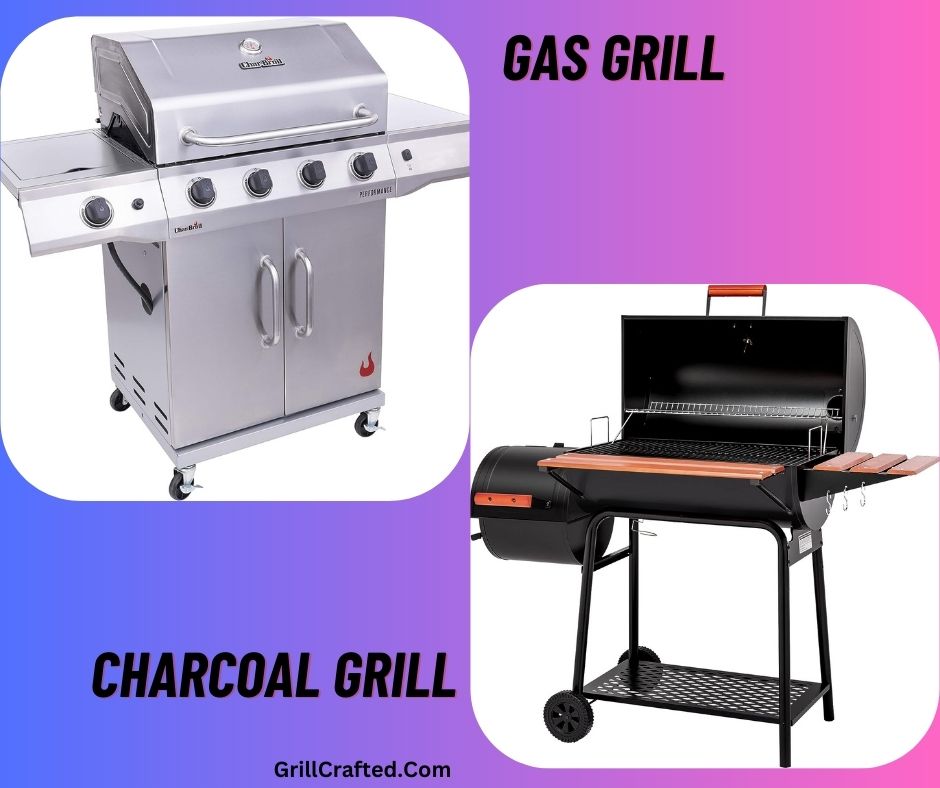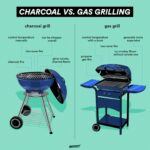
You’re standing in front of a rack filled with grills, trying to decide which one to bring home for the summer barbecue season. As you peruse the options, the age-old debate pops into your mind: gas or charcoal? Which one is better for grilling?
Fear not, dear grill enthusiast, for we are here to shed some light on this age-old dilemma and help you make an informed decision. While both gas and charcoal have their own merits, let’s explore their differences and see which one truly reigns supreme on the grill.
Is gas or charcoal better for grilling? This age-old debate has sparked many conversations among barbecue enthusiasts. Both gas grills and charcoal grills have their own advantages and disadvantages, and it ultimately comes down to personal preference.
In this article, we will explore the advantages and disadvantages of both gas grills and charcoal grills, as well as delve into the factors that impact flavor, cooking time, temperature control, searing capability, versatility, and cost.
Let’s start with the advantages of gas grills. Convenience is perhaps the biggest advantage of gas grills. They are incredibly easy to use, requiring just the push of a button to ignite the burners. Gas grills also heat up quickly, allowing you to start cooking almost immediately.
Another advantage is precise temperature control. Gas grills typically come equipped with multiple burners, allowing you to control the temperature of different cooking zones. This makes it easier to achieve the perfect level of heat for different types of food.
Lastly, gas grills are less messy compared to charcoal grills. With gas grills, there is no need to deal with ash cleanup or charcoal disposal, making the whole grilling experience more hassle-free.
On the other hand, charcoal grills have their own set of advantages. One of the biggest advantages is the smoky flavor they impart to the food. Many people believe that food cooked on a charcoal grill has a distinct, rich smoky taste that cannot be replicated by gas grills.
Charcoal grills are also known for their versatility. You can use different types of charcoal, such as briquettes or lump charcoal, to achieve different cooking styles and flavors. Additionally, charcoal grills can reach higher temperatures compared to gas grills, making them ideal for searing steaks or achieving that perfect char on your burgers.
Affordability is another advantage of charcoal grills. They tend to be more budget-friendly compared to their gas counterparts. Lastly, charcoal grills are often more portable, allowing you to take them on camping trips or picnics.
Moving on to the disadvantages of gas grills, one common criticism is that they lack the smoky flavor associated with charcoal grills. While gas grills can still produce delicious food, they often struggle to replicate that authentic smoky taste. Gas grills also have limited searing capability.
Although they can achieve high temperatures, gas grills may not have the same intense heat that charcoal grills can provide for that perfect sear. Furthermore, gas grills come with a higher initial cost compared to charcoal grills. While they may be more expensive upfront, it’s worth considering the long-term cost savings in terms of fuel.
Lastly, gas grills are dependent on a steady supply of fuel, whether it be natural gas or propane. Running out of fuel in the middle of a barbecue can be quite frustrating.
On the flip side, charcoal grills have their share of disadvantages as well. Charcoal preparation time can be quite lengthy, as you need to wait for the charcoal to heat up and turn white before you can start grilling. This can significantly delay the cooking process, especially if you’re in a hurry.
Another disadvantage is the less precise temperature control compared to gas grills. With charcoal grills, you have less control over the heat output, which can make it challenging to cook certain foods that require specific temperature ranges.
Additionally, charcoal grills require higher maintenance. You need to regularly clean out the ashes and charcoal remnants, as well as ensure proper ventilation to prevent the buildup of harmful gases. Cleaning a charcoal grill can also be more difficult, as you need to scrub off the stubborn charcoal residue.
Is GriWhat Is The Best Meat To Grill For Beginners?lling Better Than BBQ?
On the other hand, charcoal grills are lauded for their ability to infuse a distinct smoky flavor into the food. The combination of charcoal and the smoke generated as it burns creates a unique taste that is difficult to replicate.
When it comes to cooking time, gas grills generally have an advantage. With just a push of a button, gas grills heat up quickly and allow you to start cooking almost immediately. Charcoal grills, on the other hand, require more time for the charcoal to heat up and reach the desired cooking temperature. This can be a drawback if you’re looking for a quick and convenient grilling experience.
Temperature control is another important factor to consider. Gas grills offer precise temperature control, thanks to their multiple burners. This allows you to create different temperature zones for various cooking techniques, such as indirect grilling or searing.
On the contrary, charcoal grills provide less precise temperature control. While you can control the temperature to some extent by adjusting the airflow or adding fewer or more charcoal briquettes, it can be more challenging to maintain a consistent heat level compared to gas grills.
When it comes to searing capability, gas grills often fall short compared to charcoal grills. Charcoal grills can reach higher temperatures, allowing you to achieve that coveted sear on your steaks, burgers, or other meats.
The intense heat generated by the coals promotes caramelization, resulting in a flavorful crust on the outside of the food. Gas grills, while capable of achieving high temperatures, may not provide the same level of heat intensity as charcoal grills.
Versatility is another factor to consider. Gas grills offer a wide range of cooking options, thanks to the availability of accessories such as griddles, rotisserie kits, and smoker boxes. This allows you to experiment with different cooking techniques and flavors.
Charcoal grills, while not as versatile in terms of accessories, offer flexibility in terms of charcoal type. By choosing between briquettes or lump charcoal, you can create different heat levels and flavors, catering to your specific grilling needs.
Lastly, let’s talk about cost. Gas grills generally have a higher initial cost compared to charcoal grills. They typically come with more advanced features and technology, contributing to their price tag. However, it’s important to consider the long-term cost as well.
Gas grills tend to be more fuel-efficient, resulting in lower ongoing fuel expenses. On the other hand, charcoal grills are generally more affordable upfront, making them a budget-friendly option. However, the cost of charcoal and the frequency of refills or replacements can add up over time.
In conclusion, the debate between gas and charcoal grills ultimately boils down to personal preference. Gas grills offer convenience, ease of use, precise temperature control, and less mess. On the other hand, charcoal grills provide a distinct smoky flavor, versatility, higher heat for searing, affordability, and portability.
Consider factors like flavor, cooking time, temperature control, searing capability, versatility, and cost when making your decision. Whether you choose the convenience of gas or the flavor of charcoal, enjoy the process of grilling and savor the delicious food that emerges from the grill!








